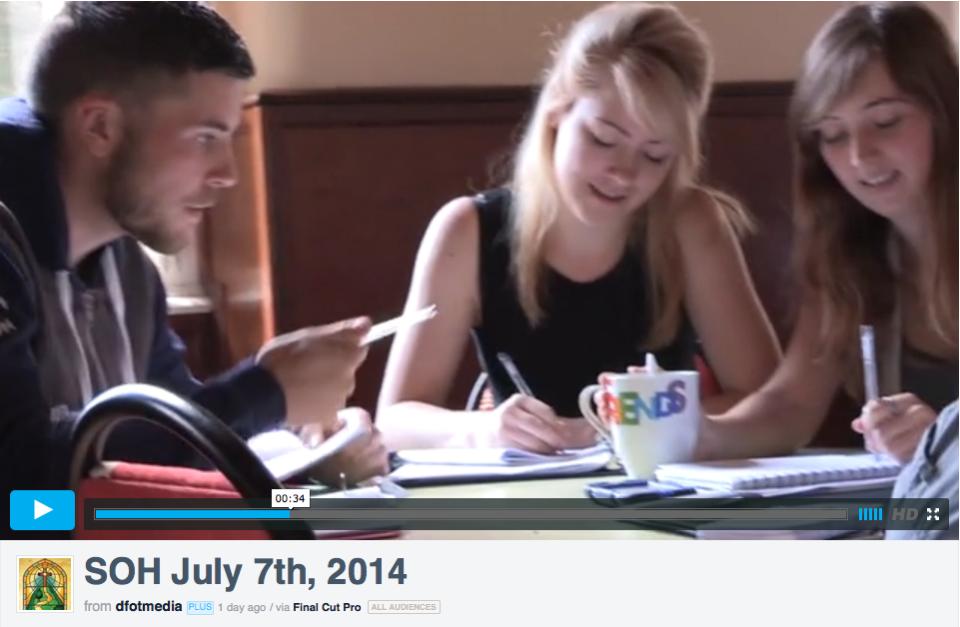From the notebooks of Tommy and Annie
July 4th, 2014
From the notebooks of Tommy and Annie
July 7th, 2014
“The eyes of the slave are on the hands of the master.”
July 4th, 2014
This morning we had guest speaker Fr. Finbar Lynch and Eileen talk to us about prayer and spiritual guidance. In order to have a good prayer life we must have discipline and we must have an environment where:
- Persons are more valued than things.
- There is room for growth and development.
- There is space for suffering.
- There is depth.
If you spend your life trying to escape suffering, you will never have peace. Jesus enables us to take up our crosses. Prayer is right from the beginning, it has already begun within us, before we are even aware of it. There are six steps involved in the immediate preparation for prayer. The first step involves self-awareness. You can approach God the same way you approach a friend, but God knows everything, which helps you to approach yourself. Step two is presence to God, in which one looks towards God and enters into His gaze. In step three, one asks for the grace to get one’s basic focus right, which is to serve and praise God. Step four is using one’s imagination to evoke God. One composes a picture as to compose oneself. In step five, I focus my desire and ask God for what I need. In the last step, I move from reflecting to relating.
In the second part of the afternoon, Eileen guided us in a prayer experience, incorporating the bible story of blind Bartimaeus. Afterwards, we shared our experiences with each other or personally reviewed them with ourselves.
In the afternoon, after lunch, Fr. Stefan gave a presentation. We discussed the different places where we receive our ideas about God. For example: nature, our parents, the bible, culture and society, and suffering. We then discussed what our ideas of God are: omnipotent, loving, compassionate, harsh, condemning, pure, one, and many others. Fr. Stephen then talked about his own experience with coming to know God the father and used the volumes throughout his presentation.
July 7th, 2014
This morning, Fr. Darragh talked about the first spiritual practice of the lay apostolate of Jesus Christ, the Returning King. The first spiritual practice is the daily offering of the Allegiance prayer, the morning offering, and the prayer for the Holy Father. He told us to think of spirituality from God’s perspective and told a story about mother’s unconditional love for her daughter, where the mother takes delight in the daughter’s seemingly worthless gift of a stemless daisy. This was a metaphor for God’s delight with our offerings to him. We talked about the small offerings we make to God each day: fasting, doing homework, chores, small annoyances in people, illness, and so on. There is a reciprocal “attitude of gratitude” between God and us when we are offering him our sufferings. The phrase “offer it up” must be taken lovingly and not the impatient way we are prone to using. Fr. Darragh then took us through the Catechism’s passages on sacrifice and on the role of all believers as a priestly people. The highest sacrifice is a humble contrite heart, as highlighted in Psalm 51. Purity of our intentions and actions is a necessary component to our offerings. To close, Fr. Darragh had a student exercise in which everyone said the first word that came into their mind when they heard the word “purity”.
“The eyes of the slave are on the hands of the master.”
In the afternoon, Anne gave the second talk, beginning with everyone’s reactions to the word “purity”. Purity nowadays is frequently associated with sexuality. We must worry less about sexual sins and sexual purity. Anne told a story about a young, severely autistic boy comforting a crying six year old girl and told us to think about this type of purity instead of jumping to sexual purity. She meant purity of heart and actions. She introduced dualistic thinking in which people are believed to be either good or bad, versus mature thinking where it is believed that people are both good and bad. Jesus doesn’t love you like you are an obligation, He can’t help but love you; he delights in you. You should likewise delight in others and yourself. Anne talked about our consciences as our sanctuaries as described in the Catechism and had us do an exercise in which we listed five good things we did in the past week. This was to help us focus more on what we are doing right and to do more of it, instead of getting bogged down by our sins. We must never disconnect our sins from our human natures. We must have hope for ourselves and for others. We are all involved in circles of service and must pipe Christ out to the world, just like the Hoover Dam pipes water to places that need it. In our consciences we must ask ourselves how we are impacting others. Are we offering Christ or our wounded self to others? As the final part of this class period, we got into groups and acted out skits representing what these two different scenarios would look like, presenting Christ or our wounds.

No comments:
Post a Comment